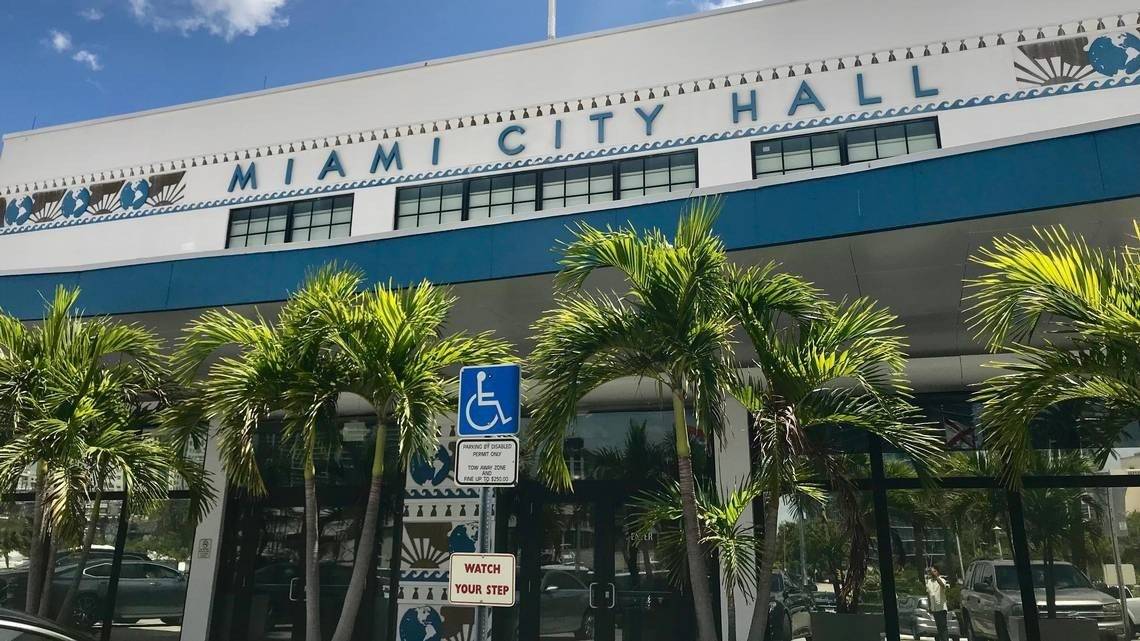FIRM IN THE NEWS: Mystery Miami proposal would hurt affordable housing, historic preservation, critics say
February 7, 2022Someone in Miami’s city government wants to eviscerate a key parking break that’s credited with fostering development of lower-cost housing and the restoration of older and historic buildings — but who and why is shrouded in mystery.
Like dozens of U.S. cities and states facing increasing traffic congestion and critical shortages of affordable housing, Miami has for several years allowed developers building downtown or in other neighborhoods abutting train and bus lines to reduce the amount of costly on-site parking they’re required to provide, or even forgo it entirely.
Supporters and city officials say the policy has been a success. Embraced by developers big and small, it has helped reduce the cost of new condos and apartments and aided the revitalization of downtown Miami while boosting transit ridership, supporters say. It has also spurred development of small-scale affordable apartments on tight lots in Little Havana and other low-income neighborhoods that sat vacant for years because they could not feasibly accommodate required parking.
But now a mysterious proposal from the city administration would undo much of that by drastically amending Miami’s parking rules — while providing no explanation or rationale for the changes.
No one at City Hall will own up to it. Not City Manager Art Noriega, whose office commissioned the proposal. Not the city attorney’s office, which drafted it. And not the planning department, whose chief of urban design briefly presented the language to the city’s Planning and Zoning Board on Wednesday night but declined to provide an analysis or rationale for a measure that seems to undermine years of departmental policy.
The proposed amendments also directly contradict the findings and recommendations of a city-appointed task force that met for six months and produced a 160-page report on updates and improvements to the city’s zoning code, known as Miami 21. The report, which among numerous other recommendations urges the city to loosen its parking requirements even more, has been bottled up at City Hall.
The planning board voted 9-2 to recommend that the City Commission reject the proposed changes. The two “no” votes came from Commissioner Joe Carollo’s appointees to the board. The measure can now be taken up by the commission, which would make a final decision on it.
BIZARRE HEARING
On Wednesday night, baffled planning board members called the proposed changes “garbage” and “bizarre.” They noted that current parking breaks have generated little opposition and that the changes appear to benefit no one, while insistently questioning city officials about who asked for the amendments and why. They got no answers.
Urban Design Director David Snow, who acknowledged his department had not analyzed the amendments, looked so obviously uncomfortable that board members commented on it.
“Clearly, staff doesn’t want to touch it,” said board member Adam Gersten. “This flies in the face of anything they have tried to pass since I’ve been on this board. This flies in the face of what the entire country recognizes as best practices. The fact that we’re even wasting time talking about this, it’s embarrassing.”
Board member Arthur Porosoff pressed Snow to say who asked for the proposal.
“No one is taking responsibility for presenting this item,” Porosoff said. “Is it a phantom?” Snow replied that the city attorney drafted the legal language.
“We are presenting the item,” Snow said. “That is really the extent of it at this time.”
The assistant city attorney advising the board, George Wysong, said “we were tasked” by the city manager but would not say more. Noriega did not respond to emailed questions from the Herald on Wednesday or Thursday.
The proposal also prompted a rare unanimity in opposition from a dozen land-use attorneys, developers, affordable-housing advocates, architects and builders present at the hearing, including representatives of the South Florida Associated General Contractors and the Builders Association of South Florida.
Two commissioners on Thursday said they knew nothing about the proposal.
In an interview, Carollo said he wasn’t aware of the proposal or Wednesday night’s vote, but he vaguely suggested he’s discussed the question with administrators before.
“Have I spoken to the administration about this before? I’m sure I have,” he told the Miami Herald. “When? I couldn’t tell you. I don’t keep track of that.”
Carollo did offer full-throated support for changes, saying he views such parking reductions as beneficial only for greedy developers who want to maximize profits. He said the developments that have used this break are not “true affordable housing,” adding that it would be a different story if the region had better mass transit.
“We do not have in place anything like what they have in other big cities in terms of public transportation,” Carollo said. “People in Miami are going to use their vehicles.”
Commissioner Manolo Reyes, who has criticized parking reductions in the past, said Thursday he has not seen the proposal. While there can be room for exceptions, he said, the city should prevent neighborhood streets from filling up with overflow parking.
“I have always been of the opinion that developers should build enough parking so that vehicles don’t spill into the neighborhood and destroy people’s quality of life,” he said.
‘ALL YOU WILL HAVE IS EMPTY LOTS’
But critics said the proposed amendments would virtually snuff out affordable infill housing development on tiny lots in Little Havana and other working-class neighborhoods made possible only because Miami 21 now allows new buildings of less than 10,000 square feet to go up without on-site parking. Many of the low-income families that occupy those apartments don’t own cars because they can’t afford them, they said.
The amendments would eliminate that parking break, which is available only along certain designated “transit corridors” across the city with high-frequent bus or rail transit, like Flagler Street. Mayor Francis Suarez was a key sponsor and supporter of the measure as a city commissioner.
“This measure was the critical key to allow those lots to be developed, to provide middle and low-income housing in neighborhoods where people actually want to live in, and paying rents they can actually afford,” said real estate broker Carlos Fausto Miranda. “I’ve seen scores of these properties be developed because of this, in a city we know is voraciously starved of this kind of housing.”
Developer Natalie Duran told the board she has built 10 small, affordable apartment buildings without government subsidies thanks to the 10,000-square-foot parking break that would not otherwise have been financially feasible. Without the ability to forgo parking, many residential city lots are so small they can’t even fit both the required spaces for cars and enough apartments to make the project pencil out financially, she said.
“Please reconsider this because it makes no sense at all,” Duran urged. “All you will have is empty lots.”
Housing experts say the price of building on-site parking in garages can be around $60,000 per space, a cost that is passed on to condo buyers and renters — an important factor in driving up housing costs. Providing more parking also leads to more driving and congestion, experts say. Critics and city planners have also said the city’s minimum parking requirements have over the years led to construction of significant number of garages that are underused, with scores of spots sitting empty much of the time, especially in downtown Miami and Brickell.
Big developers like the Related Group have taken advantage of other Miami 21 parking breaks that allow city planners to approve new building projects close to Metrorail and Metromover stations that reduce the amount of required parking by as much as half. Some new residential buildings downtown have no on-site parking, but provide residents who have cars with spaces leased in nearby public or underused private garages. The developers say there is a growing market for buyers and renters who don’t have cars and rely on transit or shared-ride services such as Uber.
The proposed Miami 21 amendments would eliminate the 50% parking reduction entirely. Developers could still seek 30% reductions, but those would have to be approved by the city commission in public hearings, instead of administratively. Snow said a quick check found between 45 and 75 projects that have been approved for parking breaks since 2018.
Critics said requiring parking breaks to be approved by the commission would significantly slow approvals, increase costs, strain administrative resources and inject politics into the process, likely discouraging many developers from seeking them.
“That means everything on Brickell and downtown Miami will be before this board and the City Commission,” prominent Miami land-use attorney Melissa Tapanes Llahues said at Tuesday’s hearing. “To change it will only benefit land-use lawyers and is really unnecessary. The city of Miami does not have the resources. I would urge you to figure out why this is being proposed.”
Tapanes Llahues, who chaired the city’s Miami 21 task force, also said the proposed changes would make it difficult for owners of older or historic buildings that can’t accommodate increased on-site parking — or sometimes any parking at all — to rehab and expand them for new uses.
She suggested that could hurt plans by developers like her client Moishe Mana, the largest single landowner along downtown Miami’s historic Flagler Street, who is rehabbing and developing several blocks into a tech and innovation district. The properties qualify for parking exemptions because of their proximity to Metrorail and Metromover stations.
“We are master-planning an entire neighborhood,” Tapanes Llahues said, calling the current Miami 21 parking rules “successful.”
Without the exemptions provided by current Miami 21 rules, just adding a bathroom or a ramp for disability access would trigger requirements for adding parking that many older or historic properties can’t meet, lawyers and planners say.
Only one board member, Carollo appointee Alex Dominguez, spoke in favor of discarding the Miami 21 parking breaks. He argued developers will build with required parking if they have to, and contended the city has a shortage of places to park.
Dominguez, who briefly got into a verbal altercation with fellow board member Gersten, said he sees “zero benefit” in allowing less parking.
After the board voted against the proposed changes, one member made an unusual plea to the audience. Hector Luis Silva Jr. urged critics of the measure to show up at City Hall if and when it comes up for commission approval. He implied it came to the planning board, as city rules require, only to get it to the commission for final approval.
“We have no idea of the motivation for this,” Silva said. “Show up in fuller force. Bring your friends. City staff can’t even defend it. It was [done] with the purpose of ending up at city commission, so they can do whatever.”




















































